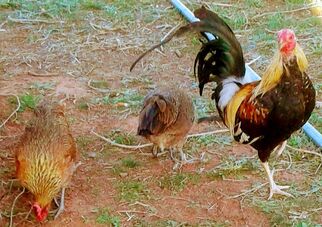 Photo of Rocky Rooster & His Ladies. CHOE
Photo of Rocky Rooster & His Ladies. CHOE
Before you start composting your poultry coop bedding you need to see these study results. Do not allow your chickens to play in your compost if you want to prevent some very serious health issues. Studies show serious health issues such as leg problems and bacterial infections are associated with chickens which are allowed to roam into compost piles. Many chicken owner's recycle old litter from their hen houses and coops which is a good, environmentally friendly way of getting great fertilizer for your garden, dispose of dirty litter, and give your chickens hours of enjoyment while they are scratching around looking for insects and grub worms.
Some people say they let their chickens play in their compost piles citing the fact that the chickens happily, stir the compost, while finding tasty treats which makes taking care of the compost easier.
Why you may not want to let your chickens play in your compost
Fresh compost contains rotting food, scraps, leaves, etc. depending on whether you are using green or brown materials but no matter which type you are using before the pile actually starts heating up and composting real good much of the scraps develop mold spores, and mildew. due to the fact that your chickens can get very sick and develop serious leg problems from bacterial infections, and parasite infestations which can easily be picked up in the early stages of composting. After the pile has matured there are less chances of them acquiring the infections and infestations. However, while the chickens are stirring your compost they are also defecating in it. Chicken feces have very high concentrations of nitrogen in them which lessen as they dry and decompose. This nitrogen if not matured properly and put in your garden can actually burn your plants and make area's of your garden barren.
"Another management concern is the moisture level of freshly composted litter. Litter must be allowed to dry after composting is completed and before reuse because leg problems and litter caking have been associated with wet litter" (Harms and Simpson, 1977; Martland, 1984). Wet litter and wet compost piles can cause health issues for your chickens. Areas that chickens are allowed to play in should be kept clean and dry at all times. Compost should be completely dry before using it in your garden or allowing your chickens to play in it (Brake, Dr. Julian D. 1992).
Some people say they let their chickens play in their compost piles citing the fact that the chickens happily, stir the compost, while finding tasty treats which makes taking care of the compost easier.
Why you may not want to let your chickens play in your compost
Fresh compost contains rotting food, scraps, leaves, etc. depending on whether you are using green or brown materials but no matter which type you are using before the pile actually starts heating up and composting real good much of the scraps develop mold spores, and mildew. due to the fact that your chickens can get very sick and develop serious leg problems from bacterial infections, and parasite infestations which can easily be picked up in the early stages of composting. After the pile has matured there are less chances of them acquiring the infections and infestations. However, while the chickens are stirring your compost they are also defecating in it. Chicken feces have very high concentrations of nitrogen in them which lessen as they dry and decompose. This nitrogen if not matured properly and put in your garden can actually burn your plants and make area's of your garden barren.
"Another management concern is the moisture level of freshly composted litter. Litter must be allowed to dry after composting is completed and before reuse because leg problems and litter caking have been associated with wet litter" (Harms and Simpson, 1977; Martland, 1984). Wet litter and wet compost piles can cause health issues for your chickens. Areas that chickens are allowed to play in should be kept clean and dry at all times. Compost should be completely dry before using it in your garden or allowing your chickens to play in it (Brake, Dr. Julian D. 1992).
References
Brake, Dr. Julian D. (1992). A practical guide for composting chicken manure. Mississippi State University. http://www.poultry.msstate.edu/extension/pdf/guide_poultry_litter.pdf
Brake, Dr. Julian D. (1992). A practical guide for composting chicken manure. Mississippi State University. http://www.poultry.msstate.edu/extension/pdf/guide_poultry_litter.pdf


